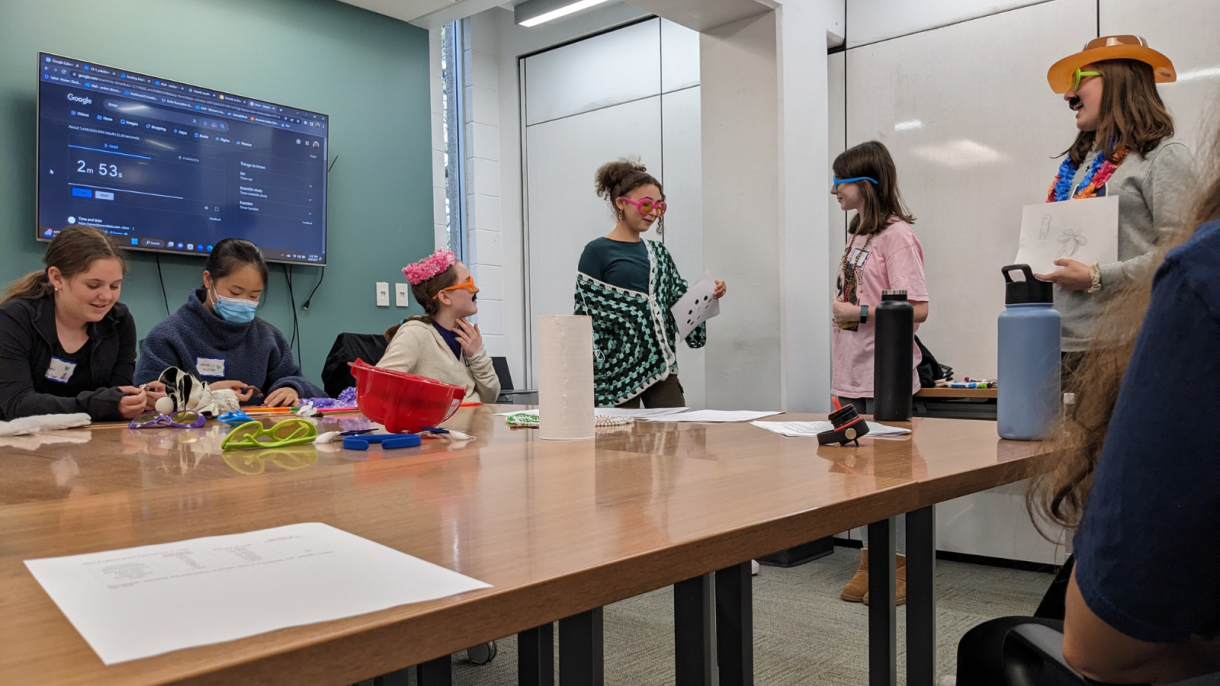

Team profile by Amber Skinner
The gender gap in STEM has many causes, two of which are cultural expectations for women and young girls, and differences in spatial reasoning between women and men that result in a disparity in spatial reasoning performance. Outside research demonstrates that women can both improve spatial reasoning through training and overcome the negative impacts caused by harmful stereotypes. Our research focused on ways to strengthen spatial reasoning skills in middle school girls and improve their beliefs in their ability to do math.
To study how to improve girls’ math identity, the project team created Girls Exploring Math (GEM) during the 2018-2019 academic year, a program that combines math and gender studies into two-hour workshops for middle school girls. The workshop plans were largely developed and run by three pairs of mentors, comprised of the undergraduate members of the team. Since its creation, the project leaders have organized and led four semesters of spring workshops along with the team’s undergraduate mentors.
During the fall semester, the team came together weekly to discuss relevant research on gender differences in STEM. One goal of the weekly meetings was for all team members to develop a deeper understanding of the gender gap — the causes, underlying factors, effects on young women, etc. — both for their own edification and to have the in-depth knowledge and awareness required to lead workshops during the spring semester. The team discussed the materials among themselves in class meetings, with the project leaders asking thought-provoking questions. The class also included a panel discussion with other women in STEM. In addition, the mentors underwent training to be able to develop workshop materials and lead interactive discussions with middle school girls. Throughout the semester, mentors were required to create and run sample workshop plans. During both the short mid-term practice workshops and the longer final practice workshop, team members acted as the participants so that mentors could practice implementing the material in a classroom setting.

The spring workshops began in mid-January and continued through late April. The first and last workshops began with a two-part voluntary survey, the first section being composed of math problems to assess math ability and confidence, and the second designed to assess beliefs about gender and STEM. By providing a survey at the beginning and end of the workshop series, team researchers hoped to measure any changes in both the girls’ math ability, confidence, and their awareness of gender bias in STEM. For the eight workshops in between, mentors led creative, hands-on activities that led to a lot of excitement and giggles, as seen below! Like the survey, each workshop was divided into one math and one gender section, all developed by the mentors and project leaders. The math activities were designed to simultaneously improve the girls’ spatial reasoning and demonstrate that math is more than what they may encounter in a math class, both of which were meant to improve the girls’ confidence in their own math abilities. The gender section presented research on women in STEM in a digestible way, and gave the girls a space to reflect internally and discuss ideas for improvement with others.

The team will continue the workshops and research with longer summer workshops and throughout the 2023-2024 academic year.
Assessing and Improving Girls’ and Women’s Math Identity
Poster by Paige Knudsen
